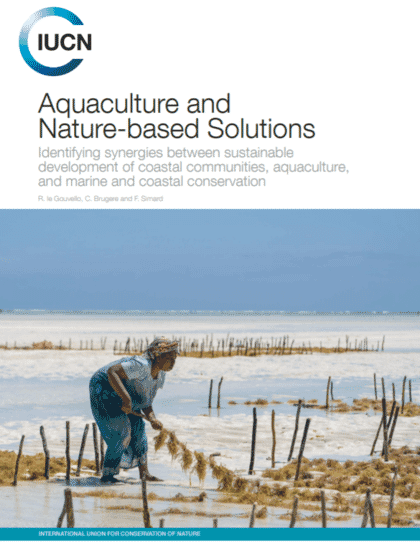
Developed under the AquaCoCo project and financed by the French Development Agency the report examines the emerging concept of nature-based solutions (NbS).
NbS potential is examined by looking at the IUCN Global Standard for NbS. The eight criteria of the Global Standard are shown as having a strong anthropogenic connotation, and they highlight that the central scientific concept of NbS is embedded in ecosystem-based approaches and management.
Instruments for the evaluation of ecosystem services (ES) and the degree of ecological engineering are essential parts in NbS design and assessment. In this context, the report then reviews the eight criteria of the IUCN’s standard, taking into consideration the prevailing issues in aquaculture, such as the ecosystem approach for aquaculture (EAA).
The authors then examine the NbS framework as an opportunity to enhance the sustainability of aquaculture systems, and conclude:
- The Global Standard may provide opportunities to re-establish and further develop traditional local savoir-faire in aquaculture, as advocated by IUCN Resolution 045 for the creation of a Global Indigenous Network for Aquaculture (GINA). The restoration of traditional coastal ponds in Hawai’i illustrates this situation.
- EAA is widely recognised as being so far disappointing in its actual implementation and expansion since its launch 10 years ago and exploring how the release of the Global Standard could offer an opportunity in reinvigorating EAA and reduce weaknesses that have been acknowledged.
- The Global Standard could provide new opportunities to explore synergies between aquaculture and marine protection. One of the expected positive outcomes, when the NbS framework is applied to aquaculture, is its ability to translate the complexity of assessing the sustainability of coastal social-ecological systems, including an aquaculture component, into practical, local and specific terms.
The authors note that some aquaculture systems meet all eight NbS criteria. However, the report argues that the type and role of engineering and human intervention are still being debated among various authors, so a discussion and clarification are therefore still needed to determine whether aquaculture-related systems are considered as acceptable NbS, considering the extent of human-based artificial inputs and actions involved in the systems.
According to the authors, it may be difficult in aquaculture to distinguish between a solution that is dependent on natural ecosystems, and a solution that is based upon a quite artificial aquaculture system, which is well managed, but decoupled from naturalness..
Similarly, they argue it might also be critical for some aquaculture systems to provide clear evidence of a net benefit for biodiversity. For instance, even for seaweed farming in coastal conditions, the Zanzibar case study shows that precautions need to be taken in the management of aquaculture activity regarding the integrity of seagrass beds.




